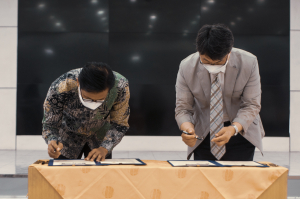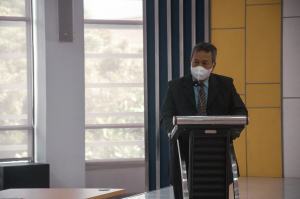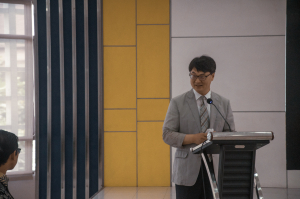On Friday, July 15th, 2022, ASEAN Studies Center Universitas Gadjah held a virtual Bincang ASEAN Discussion on the issue of disaster risk management. Rising the theme of “Measure the Readiness of Member Countries in Dealing with Disasters”, the Bincang ASEAN this time attempted to reveal how each of the ASEAN member countries and the ASEAN itself in aiding a disaster-prone area.
This time, we invited Dr. Daniel Petz as a keynote speaker, he is a Postdoctoral Researcher at the University of Graz and has an interdisciplinary research interest in intergenerational climate justice and basic needs. In his presentation, Dr. Daniel Petz briefly explained the current trends, capacities, and challenges that are faced by Southeast Asian countries in disaster risk management. Dr. Daniel argued that ASEAN is one of the most disaster-prone regions in the world due to natural hazards, and 7.68% of the global disaster mortalities occurred in the ASEAN region during the period of 2015 – 2020, ironically Southeast Asia contributed to 6.135 of the 79.834 deaths to the disasters that occurred worldwide in the period.
According to this matter, Dr. Daniel explained the cycle of disaster management when a disaster strikes an area. The step-by-step that should be included in the disaster management recycle include preparedness, individual disaster response, response/relief, rehabilitation, reconstruction, and last but not least mitigation/risk assessment prevention. This cycle of disaster management steps should have a correlation each to make sure that the humanitarian assistance is implemented on the right track. To be well-implemented, this cycle should be supported by the aspect of capacity, which is determined as a combination of all strengths, attributes, and resources available within a community, society, or organization that can be used to achieve agreed goals. This capacity may include infrastructure and physical means, institutions, societal coping abilities, as well as human knowledge, skills, and collective attributes such as social relationships, leadership, and management.
The trends in disaster risk management in Southeast Asia are divided into several sectors including national capacity building (laws and policies, institutional structures, national regional, and local capacity), regional capacity building, climate change adaptation and resilience building, international frameworks, and the challenges itself. To support this, ASEAN has established the ASEAN Humanitarian Assistance (AHA Centre) to provide assistance in dealing with the disasters that occurred in the region. The Centre has also implemented numerous systems and tools to facilitate the ASEAN Member States’ coordinated and collective response to disasters. Since its establishment, the Centre has enacted emergency mechanisms for a total of 36 disasters in seven countries across the region as of March 2021, which includes preparedness and assessment missions on seven occasions. Speaking of the challenges, the regional approach to disaster risk management is limited in the funding and capacities that could be resourced. Also, the challenges that came from the DRM itself on its preparedness, coordination, international standards, localization, integration of DRR, and CCA, and the current situation on the Covid-19 Pandemic.
To conclude his presentation, Tunggul Wicaksono, our research manager moderated and bridged Dr. Daniel Petz’s presentation to be responded to by Septyanto Galan Prakosa as the discussant for this Bincang ASEAN. Tunggul Wicaksono highlighted and has marked some notes that the DRM has evolved with its reduction measures along with the people and communities’ system that was already established. However, the challenges remain at the local, national, and regional levels also in adaptation and resilience building on climate change. In the ASEAN context, the member states agreed to handle the disaster in collective cooperation, and AHS Center has successfully developed training for capacity building, that includes the preparedness and assessment mission.
To enrich the discussion, Septyanto Galan Prakosa, a Ph.D student at Sun Yat-Sen University also joined to give his particular point of view regarding this matter.
“If we compare to other regions or any other regimes of regional organizations, not all of part of the words have a set of actions regarding DRR and DRM respectively. For example, if we compare it with South Asia, they already have this kind of mechanism such as SAARC, however, it is not yet complete or comprehensive as what ASEAN has. Of course, if we compare it with the EU, we still have room to learn. The general idea is, that we have no role model to develop in the first place. Since this area is special, in terms of political relations, economic development, and socio-cultural situation, particularly in terms of disaster management, reduction, and prevention in the area that is prone to disaster. Even though only two countries are most likely struck by disasters, the Philippines and Indonesia, basically how the Philippines protected us from typhoons and how Indonesia saved the rest of the region from the big earthquake that happened alongside the ring of fire. Still, some form of cooperation is a big achievement for us. So, if we want to critique, just remember that ASEAN has the mechanism and alternatives that can be used in response to disasters. If we try to evaluate certain points of disaster management that should be taken into mind about mitigation, prevention, response, and recovery, I want to emphasize the terms of preparedness. Because what we have lacked in ASEAN, blatantly speaking, needs to rethink about is how to harmonize or synchronize the existence of disaster risk with the basic elements of the region, which is the people who live there.”
The discussion also became more interesting with the Questions and Answers session with participants that came from many different backgrounds. The talk was lively as participants were eager to raise questions on the development and regional approach toward disaster risk management in ASEAN.
#ASEAN #SoutheastAsia #ASEANStudiesCenter #ASC #UGM#DRM #DisasterRiskManagement #Webinar #BincangASEAN#BringingASEANCloserToYou
Report by:
- Syukron Subkhi (Media and Publication Officer)
- Vanya Gerina A. (Programme Intern)




